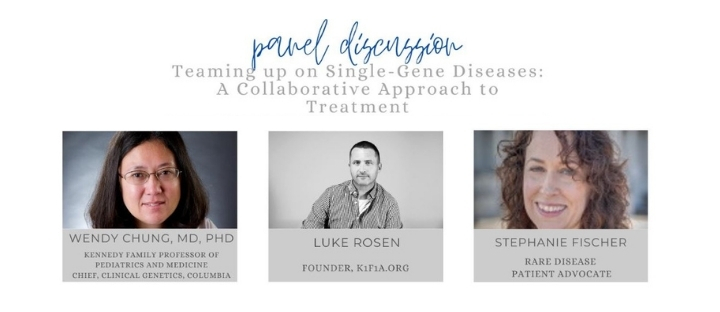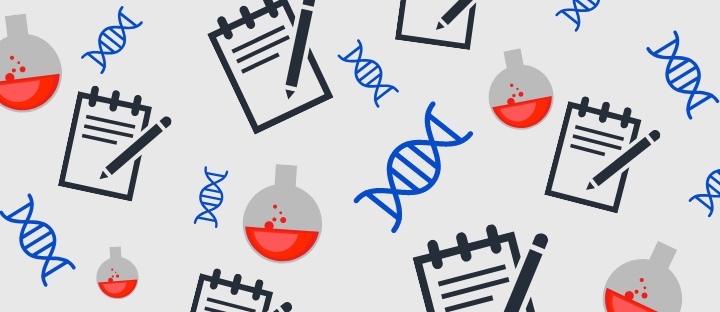#ScienceSaturday posts share relevant and exciting scientific news with the KAND community. This project is a collaboration between KIF1A.ORG’s Research Engagement Team Leader Alejandro Doval, President Kathryn Atchley, Science Communication Associate Aileen Lam and Chief Science Officer Dr. Dominique Lessard. Send news suggestions to our team at impact@kif1a.org.
Save The Date!
KIF1A.ORG Team Member, Researcher and Advocate to Speak at “24 Hours of Rare” Event
Mark your calendars for February 28th at 1pm Eastern Time as 24 Hours of Rare presents “Teaming up on Single-Gene Diseases: A Collaborative Approach to Treatment.” Led by KIF1A.ORG Co-Founder Luke Rosen, KAND clinical expert Dr. Wendy Chung and fierce KIF1A advocate Stephanie Fischer, you don’t want to miss this thoughtful and insightful discussion on building lasting partnerships in rare disease. Click the button below to register!

Recent KIF1A-Related Research
IS THERE A DUTY TO REINTERPRET GENETIC DATA? THE ETHICAL DIMENSIONS
As the process to interpret patient data from genetic testing continues to evolve, ethical questions about periodic reinterpretation of data have been raised. Furthermore, who would be responsible for that duty and how could it improve patient health? This dilemma is an important consideration for the rare disease community, including those affected by KAND, as genomic testing is widely used to reach a diagnosis. In this article, the authors explain that there should be an ethical duty for the healthcare system to routinely reinterpret and reclassify patient data as a way to reduce inequities that come from inconsistencies amongst varying clinicians and laboratories. One proposition is a guideline to help implement this process by highlighting key areas of concern, such as where the data will be stored, who is in charge of initiating and conducting reinterpretation, and how the patients will be recontacted among many other considerations.
This comprehensive article emphasizes that reinterpretation can bring the benefit of more accurate interpretation of identified variants, especially variants of uncertain significance, as computational tools are evolving and additional population data is available. Having this data reinterpreted in the future when more advanced technology is available could be an advantage, especially for those in ethnic and racial minority populations. However, despite the good that reinterpretation could bring, the implementation of this process comes with many complexities. Although the article touches upon many concerns associated with reinterpretation, solutions to those questions need to be further discussed such as cost and insurance coverage. On top of that, the emotional and psychological state of patients’ must be considered if they were to be contacted with their reinterpreted data. Further exploration of reinterpretation is important to determine what guidelines to prioritize and having these discussions in all patient communities is helpful to gain perspective. When thinking about the KAND community, the opinions of patients and families directly affected are most valuable to tackle ethical dilemmas that are centered around the quality of patient care. What are your thoughts? If you want to learn more about the details behind the consideration of reinterpretation and what that could possibly look like, check out the article below!
Rare Disease News
Researchers release analysis of largest, most diverse genetic data set
Researchers from the University of Maryland School of Medicine (UMSOM) have published an analysis of genetic data from over 53,000 individuals, specifically focused on the genetic data of minority populations comprised of diverse racial and ethnic backgrounds, who are often underrepresented in genetic studies. Impressively, this study is one of the largest and most diverse whole genome studies ever conducted. The goal of this study was to identify genetic variants, or differences in DNA between individuals, that cause or increase risk for disease and/or disability. Furthermore, this study aimed to understand how specific environmental factors (location, living conditions, etc.) can contribute to differences in diseases across diverse ancestries. Intriguingly, of the 400 million identified genetic variations identified, 97% of them were considered extremely rare (less than 1% of the population). Furthermore, because of the very large sample size AND the longitudinal nature of this study (data collected over time), “the investigators were able to demonstrate that the rare variants represent recent and potentially deleterious changes that can impact protein function, gene expression or other biologically important elements.” Affecting individuals in every corner of the world, our collective effort to tackle cures for genetic-based rare diseases needs a global approach. Thanks to the authors of this study, we now have a tool to further our understanding of how specific diseases impact diverse populations around the world. To learn more about how our environments can impact our genes, a concept known as epigenetics, take a look at this video below!
MY FIANCE IS MY CAREGIVER: MAKING ROMANCE WORK WITH RARE DISEASE
With Valentine’s Day right around the corner, we wanted to share a special segment written by Claire Richmond about what love looks like for her and her fiance, Michael, while she is living with a rare disease. Claire is diagnosed with Acute Hepatic Porphyria (AHP), a rare metabolic disorder that causes toxins to build up in her liver, but she didn’t know that when she was dating her now fiance. In her column, she describes how being admitted to the hospital for severe abdominal pain was a defining moment in her relationship. She was worried that having her health complications exposed to Michael would chase him away.
To her delight, he chose to stick by Claire, to navigate through this bumpy road together, and now they are happily engaged, with their relationship being a wonderful representation of how love heals and inspires hope. Built on a strong foundation of trust and communication, Claire and her fiance are fighting this battle with AHP day-by-day and side-by-side. To hear more about Claire’s story, give her beautifully written piece a read by clicking on the article below.
“Until Michael, my health was a secret best kept close to my heart, for fear of ultimate rejection — one that had nothing to do with my personality or values. I took an enormous risk by calling him that night, but it gave him a chance to show up.”

